Suntory Beverage & Food's Targets Toward 2030
Targets for Water, Greenhouse Gas (GHG) emissions, and Containers and Packaging
The Suntory Group, which includes Suntory Beverage & Food (“the Company”), is engaged in seeking solutions to the wide range of challenges facing the world and are continuing efforts to realize sustainability. In 2019, we established the Suntory Group Sustainability Vision, consisting of seven themes, to drive sustainability management across the Suntory Group.
Among them, we have set targets toward 2030 for the three environment-related themes of water, GHG, and containers and packaging and are leading pioneering efforts in these areas.

Water
Related SDGs

Targets and Results
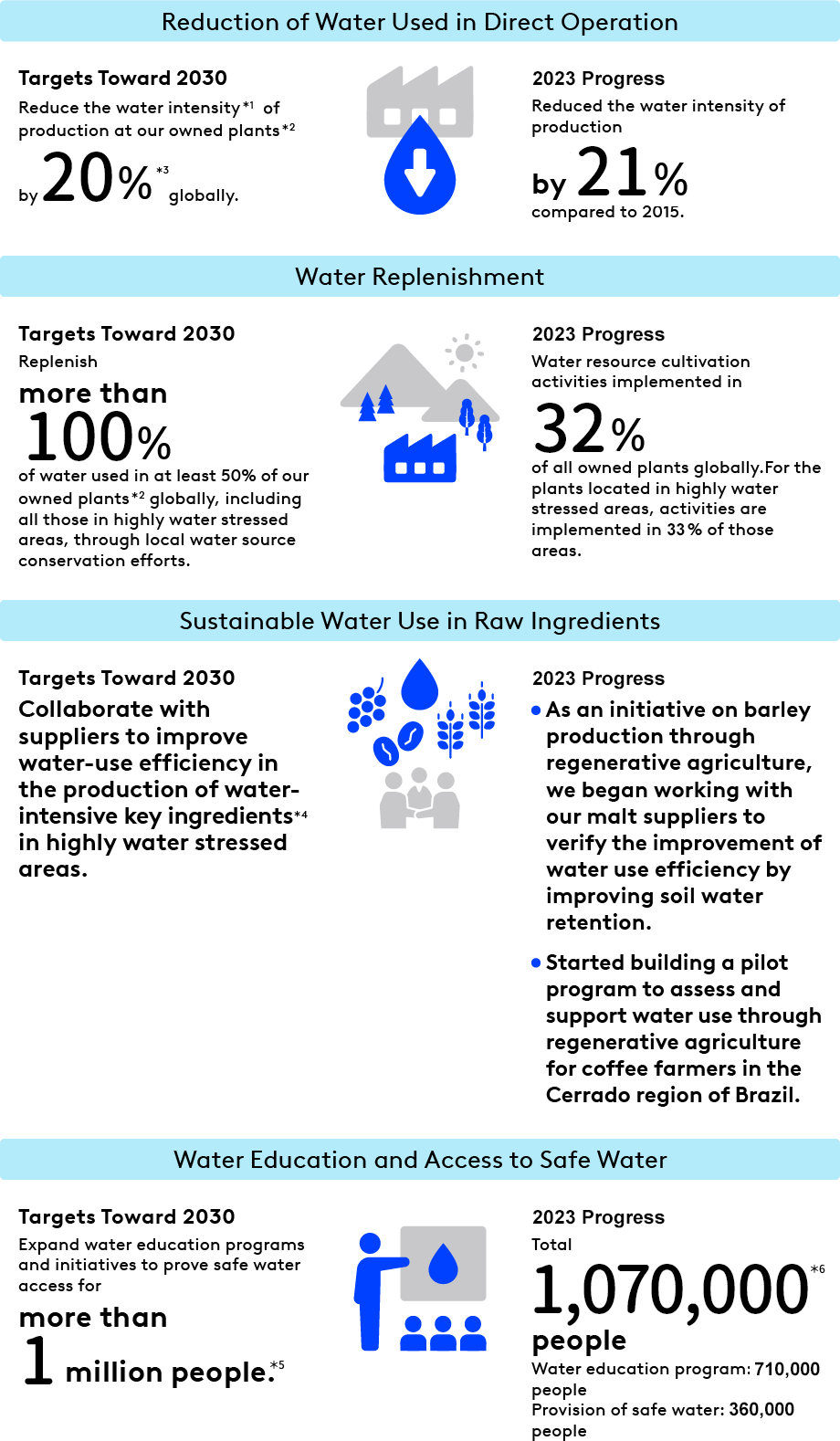
-
*1Water intensity is the amount of water withdrawn per unit of production, which is 1 kiloliter of production
-
*2Suntory Beverage & Food plants that manufacture finished products
-
*3Reduction of water intensity of production based on 2015 baseline year
-
*4Coffee, etc.
-
*5The target of 5 million people is the Suntory Group’s target.
-
*6The total is Suntory Groups's progress.
Water is a Precious Shared Resource and the Most Important Ingredient for Suntory Beverage & Food
In order to achieve “water sustainability,” the first pillar of Suntory Group’s Environmental Policy, we have shared the following philosophy across our Group companies and are implementing a wide range of initiatives.
Suntory Group’s Sustainable Water Philosophy
- Understanding the natural cycle of water
We investigate watersheds around our sites to understand the local hydrological cycle, using a scientific approach when needed.
- Promoting environmentally conscious water use
We reduce the environmental impacts of water use on the natural water cycle by implementing 3R activities and returning water to nature after adequate treatment.
- Conserving watersheds
We conserve our watersheds and endeavor to improve local water quality and quantity in cooperation with stakeholders for a sustainable future.
- Engaging with the local community
We endeavor to support our community by fostering collective actions to solve water issues and enrich society.
Our Initiatives
Suntory Natural Water Sanctuary Initiative Using Science-based Approaches
The Suntory Group, which includes Suntory Beverage & Food, started the Natural Water Sanctuary Initiative in 2003 for the purposes of improving water resource cultivation and preserving biodiversity. The initiative has now expanded to more than 12,000 hectares in 26 locations in 16 prefectures across Japan and has already recharged twice the amount of water withdrawn by our plants in Japan. With the Suntory Institute for Water Science playing a central role, we collaborate with researchers from various fields to carry out ongoing activities based on science, looking ahead decades or even 100 years into the future. We are now extending this initiative for water resource cultivation to regions around the world.
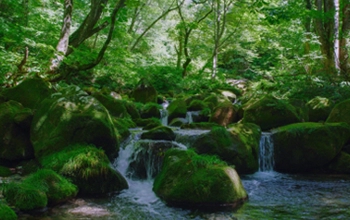
Suntory Natural Water Sanctuary
Suntory Mizuiku — Education Program for Nature and Water Designed for The Next Generation
Suntory Mizuiku — education program for nature and water is a unique program designed for the next generation to think about the importance of forests that nurture groundwater and what they can do to ensure there is water in the future. The program started in Japan in 2004 and began activities outside Japan in 2015, starting in Vietnam. The program has since expanded to Thailand, France, China, and Spain with activities focused on local water issues.
For more information, see Suntory Mizuiku — Education Program for Nature and Water.
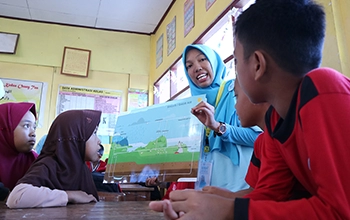
Suntory Mizuiku — Education Program for Nature and Water

Greenhouse gas (GHG)
Related SDGs

Targets and Results
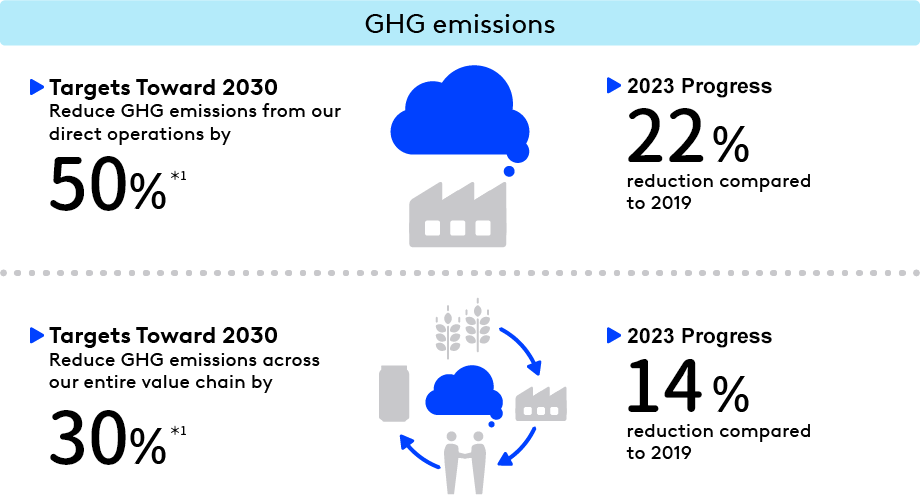
-
*1Based on emission in 2019
Aim for Net Zero Greenhouse Gas Emissions Across the Whole Value Chain by 2050
In its Environmental Vision toward 2050, the Suntory Group, which includes Suntory Beverage & Food, aims to achieve net zero greenhouse gas emissions across the whole value chain by 2050. In our Environmental Targets toward 2030, we have set the targets of reducing GHG emissions from our direct operations by 50% and across the whole value chain by 30%. To safeguard the global environment that is essential to our business foundation, we are implementing sustainability management across our entire Group and taking steps to reduce GHG emissions in our direct operations as well as other operations apart from these across the whole value chain.
Our Initiatives
Use of Renewable Energy
Suntory Beverage & Food uses 100% renewable energy for electric power purchased at all manufacturing sites and R&D facilities in Japan, the Americas, and Europe. In addition to procured power, we are installing solar panels and introducing biomass boilers to generate renewable energy on site.
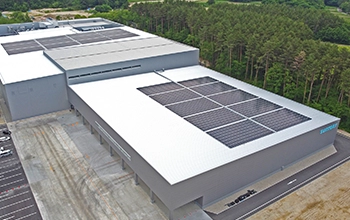
Solar panels at Suntory Kita Alps Shinano-no-Mori Water Plant
Switch to Green Hydrogen with Zero CO2 emissions
In 2022, the Suntory Group, which includes Suntory Beverage & Food, concluded a basic agreement with Yamanashi Prefecture toward realizing an environmentally harmonious and sustainable society. Under the agreement, we are aiming to install the 16-megawatt Yamanashi Model Power-to-Gas (P2G) System, one of the largest systems to create green hydrogen in Japan, at the Suntory Minami Alps Hakushu Water Plant and the Suntory Hakushu Distillery by 2025. With the P2G System, the plants will switch to using green hydrogen as fuel for heat energy. We will also explore utilizing green hydrogen in the surrounding communities together with Yamanashi Prefecture.
For more information about our GHG initiatives, see Climate Action.
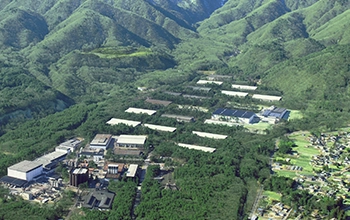
Suntory Minami Alps Hakushu Water Plant and Suntory Hakushu Distillery

Containers and Packaging
Related SDGs

Targets and Results
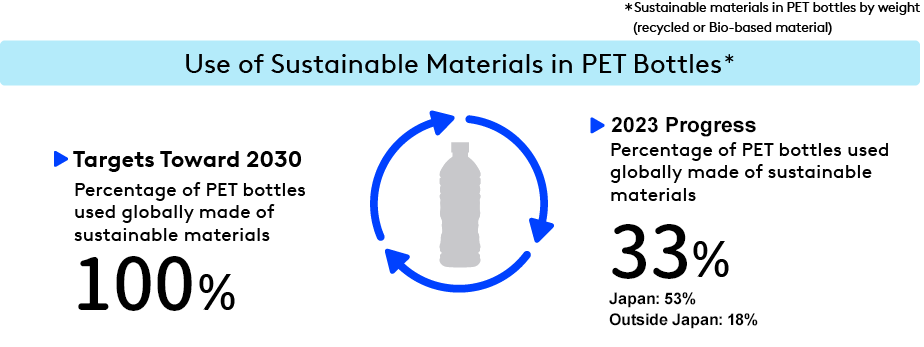
-
*Percentage of PET bottles made from 100% sustainable materials (100% recycled or plant-based materials)
Make All PET bottles Used in the Suntory Group Sustainable by 2030
We have set targets for switching all PET bottles used in the Suntory Group to recycled or plant-based material, etc. by 2030, and achieving zero use of virgin petroleum-based materials. We are conducting activities based on our unique 2R+B (Reduce, Recycle + Bio) strategy to reduce the amount of plastic used by reducing the weight of containers (Reduce), recycling containers for use as a resource (Recycle), and using Bio-based material (Bio).
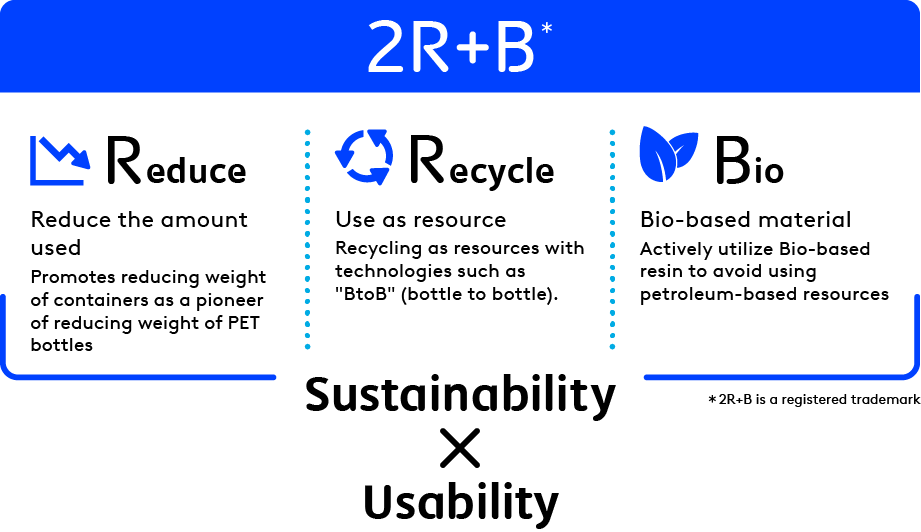
Our Initiatives
Promoting "Bottle-to-Bottle (B-to-B)" Horizontal Recycling to Create New PET bottles from Used Ones
“Horizontal recycling” is recycling to make the same product as the original one. Suntory Beverage & Food developed the Japanese beverage industry’s first bottle-to-bottle (B-to-B) horizontal recycling technology to create new PET bottles from used ones in 2011 and put the technology into practical use the following year. Currently, we have adopted the logo mark “Bottles are resources! Towards a Sustainable Bottle” on all PET bottle products in Japan*1 to more directly communicate to consumers that PET bottles are a resource that can be recycled multiple times. In 2022, we expanded the percentage of sustainable materials*2 we use to 46% of the total weight of PET bottles used in our non-alcoholic beverages business. To achieve the goal of switching all the PET bottles used for our products to sustainable materials by 2030, we are working hard to adopt recycled and plant-based materials around the world.
-
*1Excluding label-less products
-
*2PET bottles using recycled or plant-based material, etc.
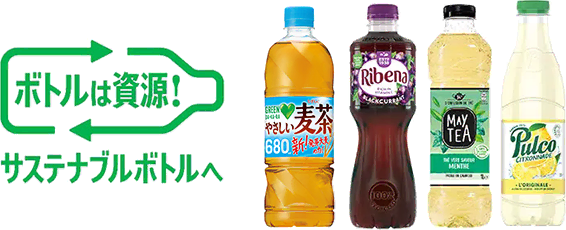
R Plus Japan Ltd., A New Company Engaged in Recycling Used Plastics
The Suntory Group, which includes the Company, has established R Plus Japan Ltd., a new joint venture company engaged in recycling used plastics, aiming to make not only PET bottles but plastics in general a resource that is perpetually recycled to create greater sustainability. R Plus Japan aims to establish recycling technology that requires fewer processes than traditional chemical recycling that creates petrochemical feedstock, leading to reductions in CO2 emissions and energy needs.
As of April 2023, the number of companies participating in R Plus Japan has expanded to 40, and cross-industry collaboration is advancing efforts for the social implementation of recycling technology.
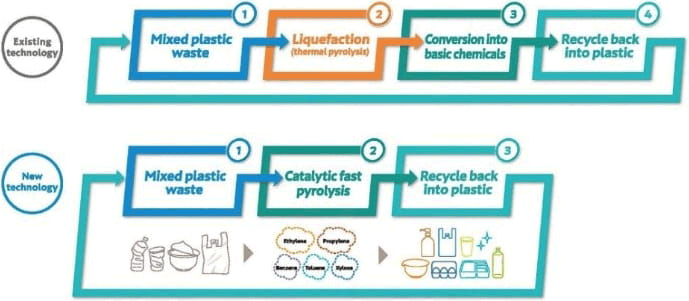
R Plus Japan is working to develop innovative recycling technology which enables to generate the raw materials of general plastics from used plastics.
For more information about container and packaging initiatives, see Packaging & Resource Efficiency.